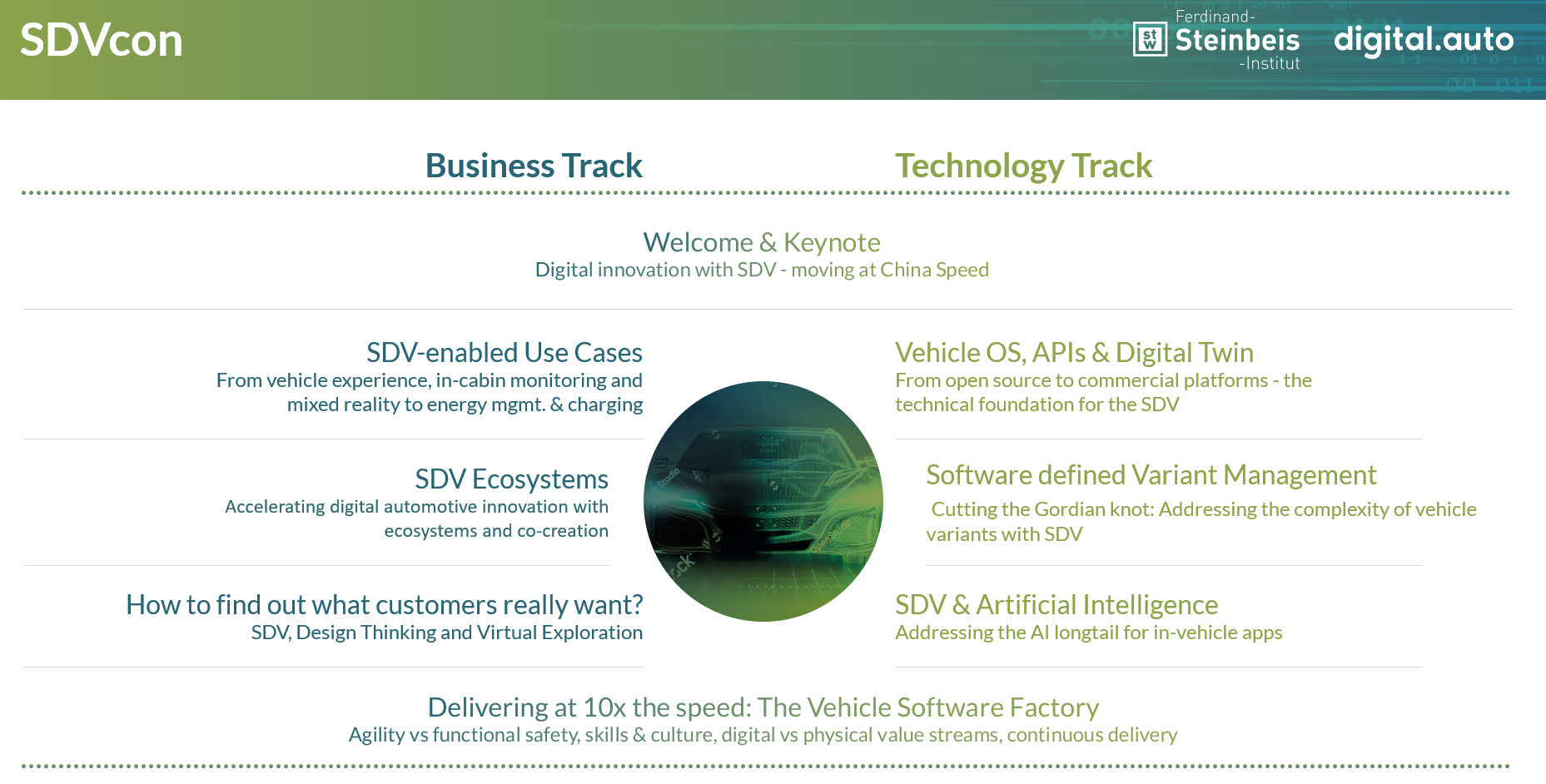
You can find the detailed program below
- Wednesday
22.11.
Towards the digital.auto: understanding customer needs and delivering at 10x the speed (Prof. Dr. Dirk Slama, Bosch)
More information will follow soon.
______________________________________________________________________________
Die Automobilindustrie Chinas: Gefahr oder Chance für die deutsche Industrie? (Fred Schulze, Audi AG)
Ist die Automobilindustrie Chinas eine Gefahr oder eine Chance für die deutsche Industrie und damit auch für die Region?
Diese Frage beantwortet Fred Schulze,…
Shifting from a gas station mindset into a connected EV charging world: Why common vehicle data models matter (Matus Banyay, Ford)
A revolution has begun - it is no matter a question if EVs are coming but rather how the industry will make it happen. While we are seeing massive investments in infrastructure, public as well as private, a war of plugs and evolving standard in the EV domain, we also observe a gas station mindset in the broad mass of adopters and stakeholders. Is the key to charging…
Driving the Future: Unifying Cloud-Native Architecture for SDV, C-V2X, and MEC Integration (Andrei Kholodnyi, Wind River Systems)
This talk offers a deep dive into the common cloud-native architecture designed to seamlessly integrate Software Defined Vehicles (SDV), Cellular Vehicle-to-Everything (C-V2X), and Multi-Access Edge Computing (MEC) technologies. As the automotive industry undergoes a transformative shift towards connected and autonomous vehicles, a unified cloud-native architecture is…
Moving at China speed: start-ups vs incumbents in the global BEV market, and the role of SDV (Ran Ding, mm1)
In the ever-evolving landscape of global mobility, China stands at the forefront of innovation and transformation. This session will explore the multifaceted dimensions of ""China Speed"" in the context of mobility – a term that encapsulates both the breathtaking pace of change and the unique challenges along with opportunities presented by dynamic mobility landscape, including massive…
How to bring Variant Awareness in Rapid Prototyping Cases using TPLE and digital.auto? (Chris Seiler, Mercedes-Benz AG)
To enable rapid prototyping of new software-defined features within the vehicle digital.auto is a perfect and easy to learn platform using the industry standard VSS(vehicle signal specification) to abstract the vehicle's hardware-defined capabilities. In this presentation we demonstrate a showcase in digital.auto that is powered by a new solution called TPLE that enables…
Automotive CX testing with real users – BMW Motorrad (Georg Hansbauer, Testbirds)
It has never been easier to develop and publish mobile apps. But how does an app team know what users actually need? How do they communicate with users? Who is there to assist if apps users need any support? And which role does crowdtesting play in the app development? Georg Hansbauer, co-founder and CEO of Testbirds, will take you on a ride through product success management, the spirit of the BMW Motorrad…
A Vision for the Future of Automotive Software Development – scaling and accelerating development (Andrea Ketzer, AWS)
The automotive industry is at a crossroads in vehicle software development. While it is difficult to steer away from the path well known, it is necessary to update development methodologies to successfully migrate to the new, software-defined era. AWS will present a vision for the future of automotive software development, introducing new innovations that will collectively…
Code Driven: Lessons Learned from the Vehicle Industry (Sebastian Werner, Kearney; Sven Kappel, Etas; Christian Hort, T-Systems)
In the ever-evolving landscape of automotive technology, the paradigm of Software Defined Vehicles is reshaping the industry at an unprecedented pace. ""Code Driven: Insights from the Vehicle Industry"" offers a unique perspective on the road to transformation.
In this session, we'll leverage our experiences and benchmarks from recent years to reveal the strategies and…

